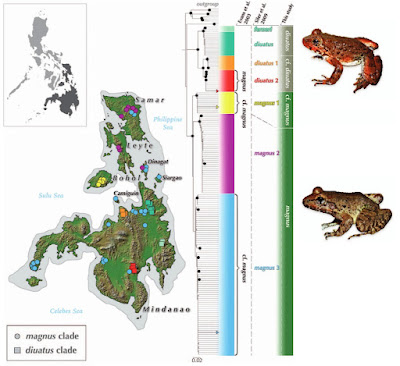 |
in Abraham, Herr, Sterkhova, ... et Brown, 2021. |
Abstract
We revisit the question of species diversity among Mindanao Fanged Frogs of the Limnonectes magnus complex consisting of L. magnus, L. diuatus, L. ferneri, and a previously hypothesized putative new species, inferred in the first molecular phylogenetic studies of the genus almost 2 decades ago. Using a multilocus molecular deoxyribonucleic acid sequence data set and comprehensive sampling of 161 individuals from throughout the Mindanao Pleistocene aggregate island complex landmasses (a distinct faunal region of the southern Philippines) we characterize geographically structured genetic diversity, focusing on the phylogenetic placement of individuals from each species' type locality. We also present new morphometric data from large samples of freshly collected material from the type localities of each included species; together with examination of the name-bearing original type specimens, we conclude that an overestimation of species diversity has occurred and has been exacerbated by the indiscriminate acceptance of the hypothesis of the existence of widespread cryptic species in this group. We place L. ferneri in synonymy with L. diuatus, clarify the identification of the latter taxon with respect to L. magnus, and apply this name to the widespread, generalist, highly variable giant Fanged Frog distributed throughout the Mindanao faunal region of the southern Philippines.
Robin Kurian Abraham, Mark William Herr, Viktoria V. Sterkhova, Rayanna Otterholt, Cameron D. Siler, Marites Bonachita Sanguila and Rafe M. Brown. 2021. Revisiting Linnaean and Wallacean Shortfalls in Mindanao Fanged Frogs: The Limnonectes magnus Complex Consists of Only Two Species. Herpetological Monographs. 35(1); 112-140. DOI: 10.1655/HERPMONOGRAPHS-D-20-00010

